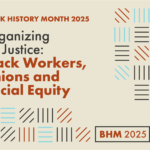
Canada’s unions urge federal government to help end transphobic harassment in the workplace
Canada’s unions are calling on the federal government to mark the International Trans Day of Visibility by ratifying ILO Convention C-190 to help end transphobic discrimination, violence and harassment in the workplace.
The International Trans Day of Visibility is celebrated around the world on March 31st as an opportunity to highlight the contributions of trans and non-binary community members.
“It’s challenging to celebrate a day like today when many trans and non-binary community members continue to fear for their safety and well-being. Trans people face disproportionately high levels of violence and harassment, both in the workplace and in the community,” said Larry Rousseau, Executive Vice-President of the CLC. “Furthermore, transphobic violence has worsened during the pandemic. The federal government must take action to make workplaces safer by immediately ratifying ILO convention C-190. Everyone has a right to enjoy a workplace free from harassment and violence.”
Convention C-190 was adopted by the ILO in 2019 and is the first-ever global treaty on violence and harassment in the world of work. It sets out clear, gender-responsive policies for governments and employers to implement in order to work towards the elimination of all forms of violence and harassment at work.
The numbers paint a stark picture. According to research by Égale Canada, 30 percent of Canadian LGBTQ2SI workers report experiencing discrimination in the workplace. For trans workers, the economic impacts of this kind of discrimination are particularly dire. Forty-nine percent of trans people are turned down or suspect they are turned down from a potential job opportunity because they are trans.
Racialized trans and non-binary people experience harassment at even higher rates. A recent report from Trans PULSE Canada on the health and wellbeing of racialized trans and non-binary people during the pandemic found that 72 percent had experienced verbal harassment in the past five years and almost half of respondents had been harassed at work or school. The majority also worried about being stopped or harassed by police or security because of who they are.
Download your copy of Workers in Transition today to learn how to be a workplace advocate for trans workers





